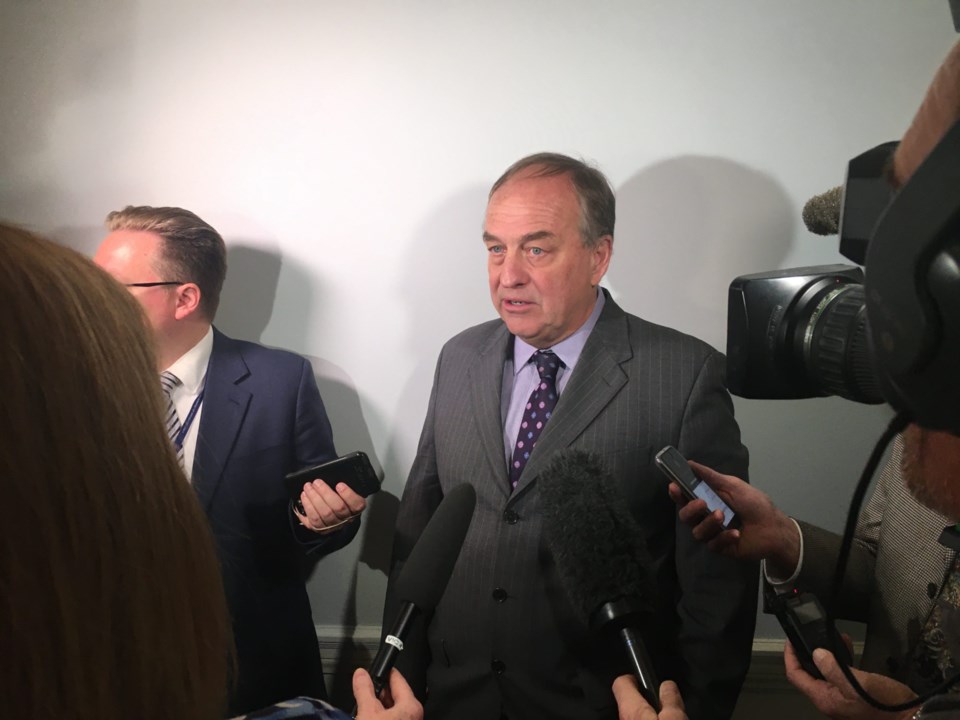Last month, Andrew Weaver announced he was done – well, almost.
After four years as leader and two terms as MLA for Oak Bay-Gordon Head, Weaver told reporters he is not seeking re-election, and is stepping down as leader of the provincial Green Party.
And when he steps down, he plans on stepping all the way down. As in, no longer a member of the Green Party.
“The day I am no longer leader, I will go non-partisan. I didn’t join a party until I was a member of the Green Party, and I will resign my membership.”
To be fair, he’s not exactly burning any bridges; he foresees his main role as giving advice to whoever succeeds him as leader – if they want it.
I have described Weaver as Canada’s most successful and influential Green politician – a characterization he (politely) bristles at. He doesn’t want necessarily to be seen and remembered as a Green politician at all. He prefers comparisons to former federal Liberal leader Stephane Dion and former BC Liberal premier Gordon Campbell – two leaders known more for climate policy than their party affiliation, as Weaver sees it.
Above all, Weaver wants to be known as someone “who gets shit done.” I can tell you this with absolute confidence, as he used this phrase three times.
Whether he wants to be remembered for it or not, Weaver has done something remarkable, building a credible, functioning provincial party from the ground up. As he admits, this was often frustratingly difficult.
“It's really been really tough with the Green Party,” says Weaver.
“Probably, the most difficult part is the level of political naivety. I see it all the time as I see these incredibly well-meaning Green supporters on Twitter who are...I mean, it's a lovely level of naivety. It's lovely. I mean, it's lovely in that I wish there was more of this, but it's a bit like the Christians being fed to the lions.”
What does he mean by that? Essentially, that too many of his party’s supporters regard compromise with the deepest suspicion, refuse to waver, and thus make progress more difficult.
“There's a political world over here. And if you want to get from A to B, it's not necessarily getting in a car and driving from A to B. It's recognizing on the path from A to B, there are stakeholders here, there are stakeholders there. Roadblocks here, roadblocks there.”
Weaver thinks the upcoming leadership race in his party will be different than other recent national and provincial contests, in that it will be nice.
“I suspect that knowing the Green party, it'll be a lot of really nice people trying to be really nice to each other, and in a such a lovely naive way.”
Whoever assumes the Green mantle, they will face a steep challenge in the next provincial election. Junior partners in minority governments often face the same dilemma: if voters like the government, they’ll vote for it; if not, vote for the party most likely to defeat it.
For Green strategists, it’s a looming problem. Weaver acknowledges this, saying he’d find it hard to criticize his NDP partners in an election campaign.
“Honestly, I don’t know how I’d run against them. And I don't know how they run against me because I couldn't look and get angry at John [Horgan] because we have a really productive working relationship. So it's really weird, which is one of the reasons I feel good about moving aside.”
Weaver speaks highly of several NDP cabinet ministers, but reserves his highest praise for Horgan, describing them as “very close.”
“We would meet every week. We spent hours together.”
If the Greens are looking for opportunities to distance themselves from the NDP, the one area where Weaver expresses strong disagreement with Horgan is the province’s expanding LNG industry. Just last week, Kitimat LNG announced it had received a 40-year export license from the federal government.
I reminded him of our conversation last year:
2019 will bring more issues that may test the NDP-Green alliance, including LNG. Weaver and his caucus are still quite negative about LNG Canada, and appear to have drawn a line in the sand on more projects. Asked if there was room for Woodfibre LNG in Squamish and/or Kwispaa LNG in Port Alberni, Weaver is clear:
“No. The answer is no.”
Weaver expressed frustration. “The premier knows that our support of his government is predicated on us meeting our climate targets and the development of a cleanBC plan. We have developed the cleanBC plan. There is a gap for each targets.”
“This is going backwards.”
In a little over a month, it will be someone else’s problem.
Maclean Kay is Editor-in-Chief of The Orca
SWIM ON:
- Maclean Kay's 2018 year-end interview with Andrew Weaver was interesting at the time, and perhaps even more so in hindsight.
- In May, the NDP backed off removing the secret ballot for union certification - and admitted it was Andrew Weaver who said no.
- Last October, the Greens expressed (polite) disagreement at being called part of a coalition. Are they an opposition party?



